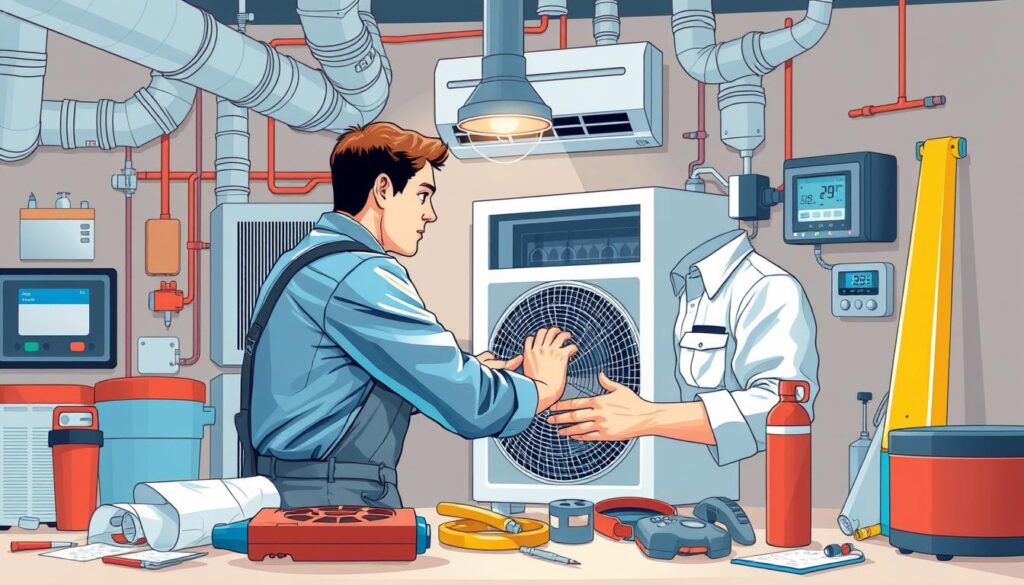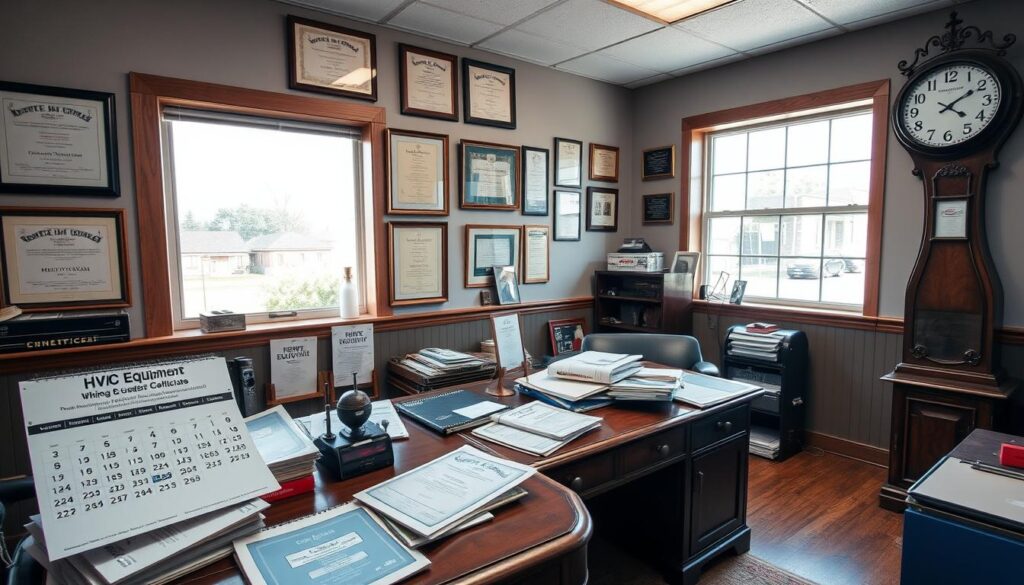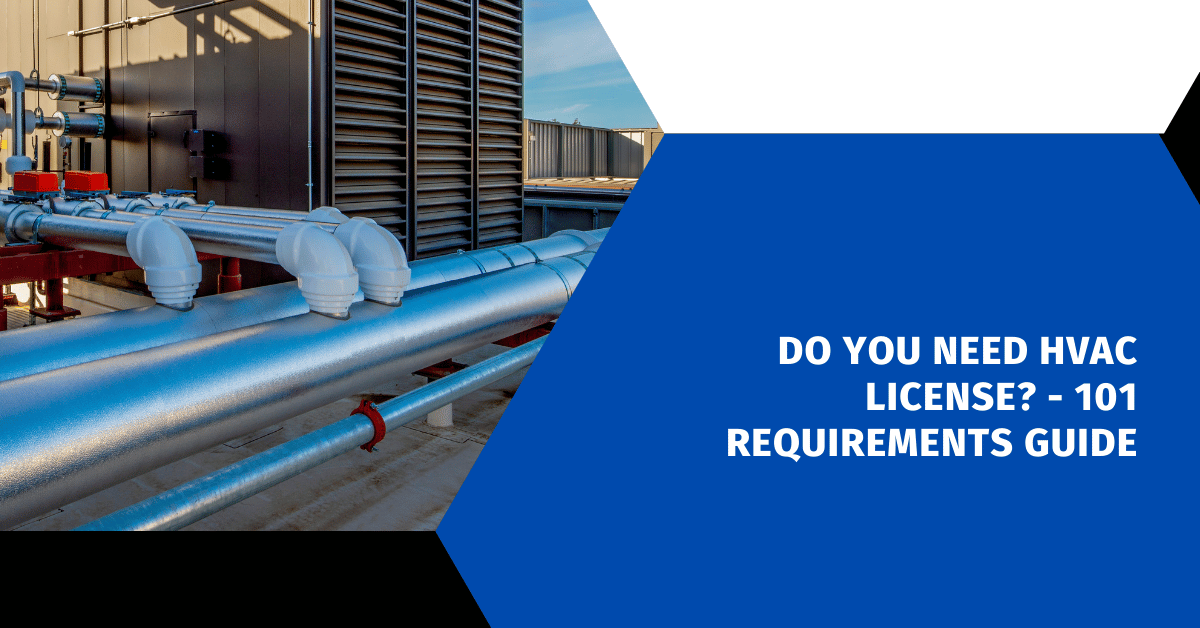Affiliate Disclosure
HVAC Guide Guys is a participant in the Amazon Services LLC Associates Program, an affiliate advertising program designed to provide a means for sites to earn advertising fees by advertising and linking to Amazon.
Do You Need HVAC License? In a busy suburban area, the Smith family faced a broken HVAC system. They tried to fix it themselves but failed. They then realized the need for a professional, not knowing the importance of a licensed HVAC contractor.
Looking for a qualified technician, they found that HVAC licensing rules change by state. Without a national standard, it was hard to know if a contractor was right for the job. This experience showed how complex HVAC licensing can be, especially for those needing reliable HVAC services.

Key Takeaways
- HVAC licensing requirements vary significantly across states and municipalities
- Proper licensing and certification ensure HVAC technicians have the necessary skills and qualifications
- Unlicensed HVAC work can lead to legal issues, penalties, and unresolved problems
- The HVAC industry is expected to grow by 4% by 2029, increasing demand for licensed professionals
- Hiring a licensed HVAC contractor protects homeowners and businesses from liability
Table of Contents
Understanding HVAC Licensing and Certification Basics
Licensing and certification are key in the HVAC world. They ensure HVAC systems are safe and work well. Knowing about HVAC licenses, the difference between certification and licensing, and EPA’s Section 608 is vital for those in this field.
Types of HVAC Licenses Available
HVAC licenses come in three main types: journeyman, master, and contractor. The journeyman license is for beginners, needing at least four years of experience. The master license shows more skill, and the contractor license is for business owners.
Difference Between Certification and Licensing
Certification and licensing are often mixed up, but they’re different. Certification shows a technician has the right training and meets industry standards. Licensing, on the other hand, is needed by law in many places for HVAC work.
EPA Section 608 Certification Requirements
The EPA requires HVAC techs to pass a test, known as the EPA Section 608 certification. This test makes sure techs know how to handle refrigerants safely. It’s about keeping the environment safe and protecting health.
Knowing about HVAC certification types, HVAC license classifications, and EPA certification is key for HVAC pros. Staying informed helps meet standards and succeed in this fast-paced field.
Do You Need HVAC License in Your State?
HVAC licensing rules change a lot from state to state. Some places, like Colorado, don’t need a state HVAC license. But, other states, like California, require a license for any HVAC job over $500.
States often have different rules for HVAC technicians and contractors. Technicians usually work under a licensed contractor to get experience. Many states have special licensing for different skill levels in HVAC.
It’s very important to know the local HVAC rules in your state. You need to understand the state-specific HVAC requirements, local licensing rules, and HVAC regulations for your work area.
Licensing Requirements Across the States
HVAC licensing rules vary a lot in the United States. Here are some examples:
- In Michigan, HVAC technicians need 3 years of experience or 6,000 hours of work. They also must pass a licensing exam.
- Missouri doesn’t have state HVAC licensing, but technicians need certifications and licenses from local boards.
- California requires a C-20 license for HVAC jobs over $500. You need to pass an exam and meet insurance and bonding needs.
Make sure to check the HVAC licensing rules in your state. This way, you can legally do HVAC work in your area.
Essential Requirements for HVAC Licensing
To get an HVAC license in the U.S., you must meet certain requirements. These can change by state. But, they usually include education, work experience, and money matters.
Educational Prerequisites
Most states ask for a high school diploma or its equivalent. Many also want formal HVAC training. This could be an accredited program or an associate’s degree in HVAC technology.
This HVAC education makes sure technicians know how to work with HVAC systems safely and well.
Experience Requirements
Getting work experience in HVAC is key. States usually want 2 to 5 years of experience. Sometimes, formal education can count as part of this.
This experience helps technicians learn how to handle different HVAC tasks and problems.
Financial Requirements and Bonds
States also check if you can handle financial responsibilities. This often means getting a surety bond. The bond’s value can be between $10,000 and $20,000.
Contractors might also need to show they have liability insurance and other financial papers to get licensed.
By fulfilling these requirements, you can get your HVAC license. This opens the door to a fulfilling career in heating, ventilation, and air conditioning.
Explore Our HVAC Shop
Looking for top-rated HVAC tools, parts, and accessories? Visit our shop and find the perfect solution for your needs.
Visit the ShopHVAC License Cost and Financial Considerations
Getting an HVAC license is a big step. It’s a key part of starting a career in heating, ventilation, and air conditioning (HVAC). The cost of getting licensed varies a lot. It depends on where you live and the rules in your area.
One big cost is the application and exam fees. These can be a few hundred dollars or more than $1,000. Also, many places require a surety bond. This can cost between $10,000 and $25,000 or more.
There are ongoing costs too. You’ll need to pay for license renewals and keep up with education and training. These costs can add up fast. So, it’s important to think about the long-term costs of getting and keeping your license.
Another big cost is HVAC insurance. You’ll need general liability and workers’ compensation insurance. These cover you from legal issues and risks. They are often required by law.
| Expense | Estimated Cost Range |
|---|---|
| Application and Exam Fees | $200 – $1,000+ |
| Surety Bond | $10,000 – $25,000+ |
| License Renewal Fees | Varies by state, usually $100 – $500 per renewal |
| General Liability Insurance | $500 – $2,000+ per year |
| Workers’ Compensation Insurance | Varies by state, typically 1-5% of payroll |
Knowing about HVAC licensing fees, certification costs, and insurance requirements helps. It prepares you for the financial side of starting in HVAC.
State-by-State HVAC Licensing Guide: Eastern States
Understanding HVAC licensing rules in your state is key. Let’s look at the rules in Florida, Georgia, and New York.
Florida Licensing Requirements
Florida has four HVAC contractor licenses: Class A and B, and registered contractors. A Class A license needs lots of experience and education. Class B requires less, and registered contractors are good for small jobs.
Georgia Licensing Requirements
In Georgia, HVAC techs need a license from the State Board of Conditioned Air Contractors. There are two types: Class I (restricted) and Class II (unrestricted). Class II allows for more work.
New York Licensing Requirements
New York doesn’t require a statewide HVAC license. But, if you work in New York City, you must get a license from the Department of Buildings. This ensures safety and technical standards are met.
Understanding HVAC licensing can be tough. But knowing your state’s rules is vital for a successful career. Stay informed to open up new chances and serve your clients well.
Explore Our HVAC Shop
Looking for top-rated HVAC tools, parts, and accessories? Visit our shop and find the perfect solution for your needs.
Visit the ShopWestern States HVAC Requirements
HVAC licensing and certifications vary across states. In the Western United States, the rules differ from other areas. Let’s explore the HVAC licensing needs in key Western states.
California HVAC License: In California, HVAC contractors need a C-20 license for jobs over $500. To get this, you need four years of experience, a $15,000 bond, insurance, and pass a state exam.
Arizona HVAC Regulations: Arizona requires HVAC contractors to be licensed by the Registrar of Contractors. You need at least four years of experience or two years plus HVAC coursework. You must also pass exams and show insurance.
Alaska HVAC Certification: Alaska has a Mechanical Administrator license for HVAC. To get certified, you must meet experience, education, and exam requirements for your HVAC area.
Not all Western states have state HVAC licenses. For example, Colorado doesn’t have a state HVAC license, but local areas might have their own rules. HVAC pros should check the specific rules in their operating states.
| State | HVAC License Requirements |
|---|---|
| California | C-20 HVAC contractor license for jobs over $500, minimum 4 years of experience, $15,000 bond, proof of insurance, and passing a state exam |
| Arizona | Licensing through the Registrar of Contractors, minimum 4 years of experience or 2 years plus completed coursework, passing trade and business management exams, proof of insurance |
| Alaska | Mechanical Administrator license with HVAC-related categories, meeting specific experience, education, and examination requirements |
| Colorado | No state-level HVAC license required, but local jurisdictions may have their own licensing rules |
Knowing your state’s HVAC licensing rules is key. It ensures you can legally and safely work. By understanding these rules, you can offer top HVAC services to your clients.

Explore Our HVAC Shop
Looking for top-rated HVAC tools, parts, and accessories? Visit our shop and find the perfect solution for your needs.
Visit the ShopHVAC Business License vs. Contractor License
Understanding the difference between an HVAC business license and a contractor license is key. Both are vital but serve different roles. They have unique needs and purposes.
Business Registration Requirements
An HVAC business license lets you run a profit-making business in a certain area. You get it by registering your business with the state or local government. You’ll need to share details about your business, its owners, and how it operates.
Insurance and Bonding Requirements
Along with a business license, HVAC contractors must get certain insurance and bonds. General liability insurance is a must, covering damage to property or injuries. Workers’ compensation insurance is needed if you have employees. Some places also require a surety bond to protect customers from problems or disputes.
| State | HVAC Business License Requirement | Insurance and Bonding Requirements |
|---|---|---|
| Kentucky | The fees for an HVAC Contractor License application range from $150 to $375. | – |
| North Dakota | Contractors who perform more than $2,000 worth of work must be licensed as general contractors. | – |
| Pennsylvania | HVAC contractors performing residential services must register with the Office of the Attorney General as a home improvement contractor. | – |
Getting the right HVAC business license and meeting insurance and bonding needs is vital. It ensures your business runs legally and keeps both your business and customers safe.
HVAC License Exam Preparation
Getting ready for the HVAC license exam is key to getting certified. These tests cover many topics like technical skills, business practices, and laws. Here are some tips to help you pass:
- Use study guides and practice tests. Many places offer study guides or sample tests. These help you get used to the exam’s style and content. They also show you what you know well and what you need to work on.
- Sign up for review courses. Some places or groups offer courses to help you prepare. These courses give detailed lessons, interactive activities, and feedback to improve your skills.
- Work on both technical and business parts. The exam will test your technical skills and your knowledge of business and laws. Spend enough time studying both areas.
- Get to know the North American Technician Excellence (NATE) test. Many places use the NATE exam for HVAC licenses. Knowing the NATE test can help you prepare better.
Keep in mind, the exam details can change based on where you live. Make sure to check the specific rules for your area. This way, you’ll be ready for the HVAC licensing test.
“Preparation is the key to success in any endeavor. When it comes to HVAC license exams, the more prepared you are, the better your chances of passing with flying colors.”
By using these tips and the resources available, you can boost your chances of passing the HVAC license exam. Good luck with your HVAC exam prep and licensing test!
Explore Our HVAC Shop
Looking for top-rated HVAC tools, parts, and accessories? Visit our shop and find the perfect solution for your needs.
Visit the ShopLicense Renewal and Continuing Education
Keeping your HVAC license up to date is key for success. You’ll need to renew it every year or two, depending on where you live. This means paying fees and showing you’ve got the right continuing education (CE) credits.
CE is crucial for HVAC pros to stay current. States demand a certain number of CE credits. For example, Georgia asks for three hours of CE for each year. Other states might have different rules.
These credits help HVAC pros offer top-notch services. Courses might cover installation, maintenance, and energy efficiency. Some states require specific topics for renewal.
The renewal process can differ. Some states let you renew online, while others need paperwork by mail. Make sure to meet the deadline to avoid losing your license.
By focusing on your HVAC license and CE, you show you’re committed to your career. This keeps your skills sharp, benefiting both your clients and your career.
| State | Renewal Frequency | Continuing Education Requirements |
|---|---|---|
| Alabama | Annually | Varies by jurisdiction |
| Alaska | Biennially | Varies by jurisdiction |
| Florida | Biennially | Varies by jurisdiction |
| Georgia | Biennially | 3 hours per year in renewal period |
| Iowa | Triennially | Varies by jurisdiction |
| Kansas | Varies by jurisdiction | Varies by jurisdiction |
| Kentucky | Annually | Varies by jurisdiction |
| New Mexico | Triennially | Varies by jurisdiction |
| Oklahoma | Triennially | Varies by jurisdiction |
| Texas | Annually | Varies by jurisdiction |
| Virginia | Triennially | Varies by jurisdiction |
Remember, HVAC license renewal and continuing education credits vary by state. Professional development like conferences also helps keep your skills sharp.

Insurance Requirements for Licensed HVAC Contractors
As a licensed HVAC contractor in the United States, it’s crucial to understand the insurance requirements that come with the job. You’ll need general liability insurance and workers’ compensation.
General Liability Insurance
General liability insurance protects your HVAC business against third-party claims for bodily injury or property damage. Coverage limits vary by state. They often require a minimum of $100,000 per person, $300,000 per occurrence, and $50,000 for property damage. This insurance safeguards your HVAC business from lawsuits and helps ensure you’re protected if a client or customer is injured on the job site.
Workers’ Compensation Requirements
Workers’ compensation is mandatory in most states for businesses with employees. This coverage protects your workers in case of job-related injuries or illnesses. It provides medical care, lost wages, and other benefits to help your employees recover and get back to work. Maintaining proper workers’ compensation insurance demonstrates your commitment to worker protection and helps HVAC business insurance compliance with state laws.
Investing in the right liability coverage and workers’ compensation policies is crucial for HVAC contractors to protect their business, employees, and clients. By understanding these insurance requirements, you can ensure your HVAC business is properly covered and in compliance with relevant regulations.
Explore Our HVAC Shop
Looking for top-rated HVAC tools, parts, and accessories? Visit our shop and find the perfect solution for your needs.
Visit the ShopCareer Opportunities with HVAC License
Getting an HVAC license opens many doors in the HVAC industry. This field is growing fast, with a 15% job increase expected in the next decade. The Bureau of Labor Statistics says this.
HVAC techs can make good money, from $30,000 to $69,000 a year. This depends on their education, certifications, and experience. Even new AC techs can earn between $26,000 to $63,000.
There are special jobs like solar or wind turbine maintenance. These jobs pay between $29,000 to $74,000 a year. You can also teach HVAC, earning from $33,000 to $94,000 annually.
Training and getting certified costs between $5,000 to $12,000. You can finish in 6 months. To get certified, you need 1 to 2 years of experience, including NATE certification.
With an HVAC license, you can choose from many jobs. These include HVAC tech, refrigeration, and commercial refrigeration. Arizona is especially hiring, with a 31% increase in HVAC jobs by 2030.
“The HVAC industry offers strong job security and competitive pay, making it an attractive career choice for those seeking stability and growth opportunities.”
| Job Title | Average Salary Range |
|---|---|
| HVAC Technician | $30,000 – $69,000 |
| AC Technician (with HVAC certificate) | $26,000 – $63,000 |
| Solar Energy Technician (with HVAC certification) | $29,000 – $56,000 |
| Wind Turbine Technician | $40,000 – $74,000 |
| HVAC Instructor | $33,000 – $94,000 |
Conclusion
Getting the right HVAC license is key for being good, safe, and legal in the field. The rules for HVAC licenses change a lot by state. So, it’s crucial to know and follow the local laws where you work.
Having the right license and certification is good for everyone. It keeps professionals, businesses, and customers safe. It also helps you grow your career and find better job chances in a field that’s always changing.
By following industry standards and getting your HVAC license, you show you’re serious about being professional and safe. This can make customers trust you more. It can also open up more chances for you to grow and have a fulfilling career in the HVAC world.

